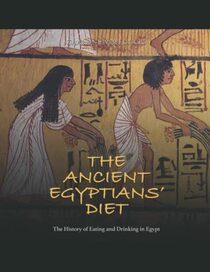This book is fascinating. While reading history, sometimes readers want to know a bit about the ordinary person and how they lived. The battles and dynasties are fine, but it is interesting to see how things change over time. For example, with the Egyptian civilization being of such a great length, we know that funerary rites changed, so why not what people ate and drank? This book answers that question.
If you are looking for a short answer, ancient Egyptians ate and drank as well as today's Egyptians. What they ate and drank would be healthier than the modern Western diet. Of course, there was a sharp difference between what the wealthy ate and the poor. Those with lesser means had a vegetarian diet with bread and beer. Egyptians made their bread from emmer, which was higher in minerals and fiber than most other grains. The aristocracy ate a much more comprehensive range of foods plus had more access to wine (versus beer).
However, this book points out that the food was nutritious and plentiful. Although no recipes remain, scientists have been able to read and replicate the wall drawings outlining beer and bread growth and preparation. The beer was highly nutritious.
The Egyptians were the first to prepare food in a particular place. The meat was expensive, and they had no way (other than salting) to preserve meat. The poor had access to meat during festivals and on special occasions. Fish was the most common non-vegetable food eaten. However, the upper classes considered fish unclean and avoided it, while priests were forbidden to eat it.
Egyptians used various oils (radish seed, sesame, flax seed, and many more). The descriptions of dinner parties are quite impressive. This book is one of the most entertaining I've read.
If you are looking for a short answer, ancient Egyptians ate and drank as well as today's Egyptians. What they ate and drank would be healthier than the modern Western diet. Of course, there was a sharp difference between what the wealthy ate and the poor. Those with lesser means had a vegetarian diet with bread and beer. Egyptians made their bread from emmer, which was higher in minerals and fiber than most other grains. The aristocracy ate a much more comprehensive range of foods plus had more access to wine (versus beer).
However, this book points out that the food was nutritious and plentiful. Although no recipes remain, scientists have been able to read and replicate the wall drawings outlining beer and bread growth and preparation. The beer was highly nutritious.
The Egyptians were the first to prepare food in a particular place. The meat was expensive, and they had no way (other than salting) to preserve meat. The poor had access to meat during festivals and on special occasions. Fish was the most common non-vegetable food eaten. However, the upper classes considered fish unclean and avoided it, while priests were forbidden to eat it.
Egyptians used various oils (radish seed, sesame, flax seed, and many more). The descriptions of dinner parties are quite impressive. This book is one of the most entertaining I've read.




